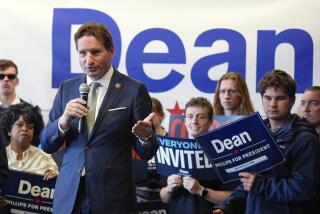Why Ron Paul isn’t top-tier
Republican presidential hopeful Ron Paul nearly tied Minnesota Rep. Michele Bachmann in a widely covered Iowa straw poll this month, so he should be considered a front-runner to face President Obama in 2012, right?
It isn’t that simple.
Last week, Opinion contributor Ronald Brownstein wrote that Bachmann, Texas Gov. Rick Perry and former Massachusetts Gov. Mitt Romney are, at this point, the front-runners.
The article prompted reader William A. Christer of West Hollywood to ask why Brownstein “failed to mention the second-place winner in the Iowa straw poll — Ron Paul”? The omission, he said, amounted to “pure personal politics as to who Brownstein actually wants as opposed to who the voters said they wanted.”
Brownstein was unavailable to comment, but because the question of who is deemed a front-runner often comes up about the paper’s coverage, we asked our Washington columnist to explain how political writers decide who is in the front ranks.
Doyle McManus responds:
It’s true that Ron Paul came in a very close second in the Iowa Republican Party’s straw poll on Aug. 13; he won almost 28% of the votes cast, just behind Michele Bachmann’s 29%. But that doesn’t make him a top-tier contender for the GOP nomination.
The Iowa straw poll is an unusual event. It’s entirely unofficial; its results don’t affect the state’s official caucuses, which are scheduled for early next year. It’s held in tents in the college town of Ames; it’s not statewide. Ballots cost $30 each, and the price of admission is often picked up by the candidates, not the voters. This year, about 15,000 Iowans participated, far fewer than the 200,000 or so who can be expected to vote in next year’s caucuses.
In short, it’s not a very reliable measure of voter sentiment, even among Republicans in Iowa. If anything, it measures which candidates have a core of fervent, energized supporters and organizations capable of turning people out. Paul met both of those tests. But does that make him a top-tier contender?
Let’s look at the polls, a more scientific measuring device. In an average of five recent nationwide polls taken this month, only two candidates consistently won support from more than 15% of Republican voters: Romney and Perry, with average showings of 20% and 17%, respectively (although Perry has surged ahead in recent polling). Bachmann, Sarah Palin and Paul all scored roughly 9% on average.
Two recent polls in Iowa came up with similar results. Without Palin on the list, Paul came in fourth with about 12%, but he was far behind Perry and Romney and a notch behind Bachmann. Of course it’s a judgment call whether fourth or fifth should be considered “top tier.” And that’s where a political analyst’s judgment comes in.
Paul has a devoted core of supporters, but he hasn’t demonstrated much ability to appeal to the broader range of voters he’d need to win the nomination. Unlike Perry, Romney and Bachmann, he’s viewed unfavorably by almost half of the GOP electorate. If he can improve those numbers, he’ll qualify for membership in that elusive top tier. But not before.
In my view, the question is whether Bachmann still belongs in the top tier. But that’s an argument for another day.
More to Read
A cure for the common opinion
Get thought-provoking perspectives with our weekly newsletter.
You may occasionally receive promotional content from the Los Angeles Times.






